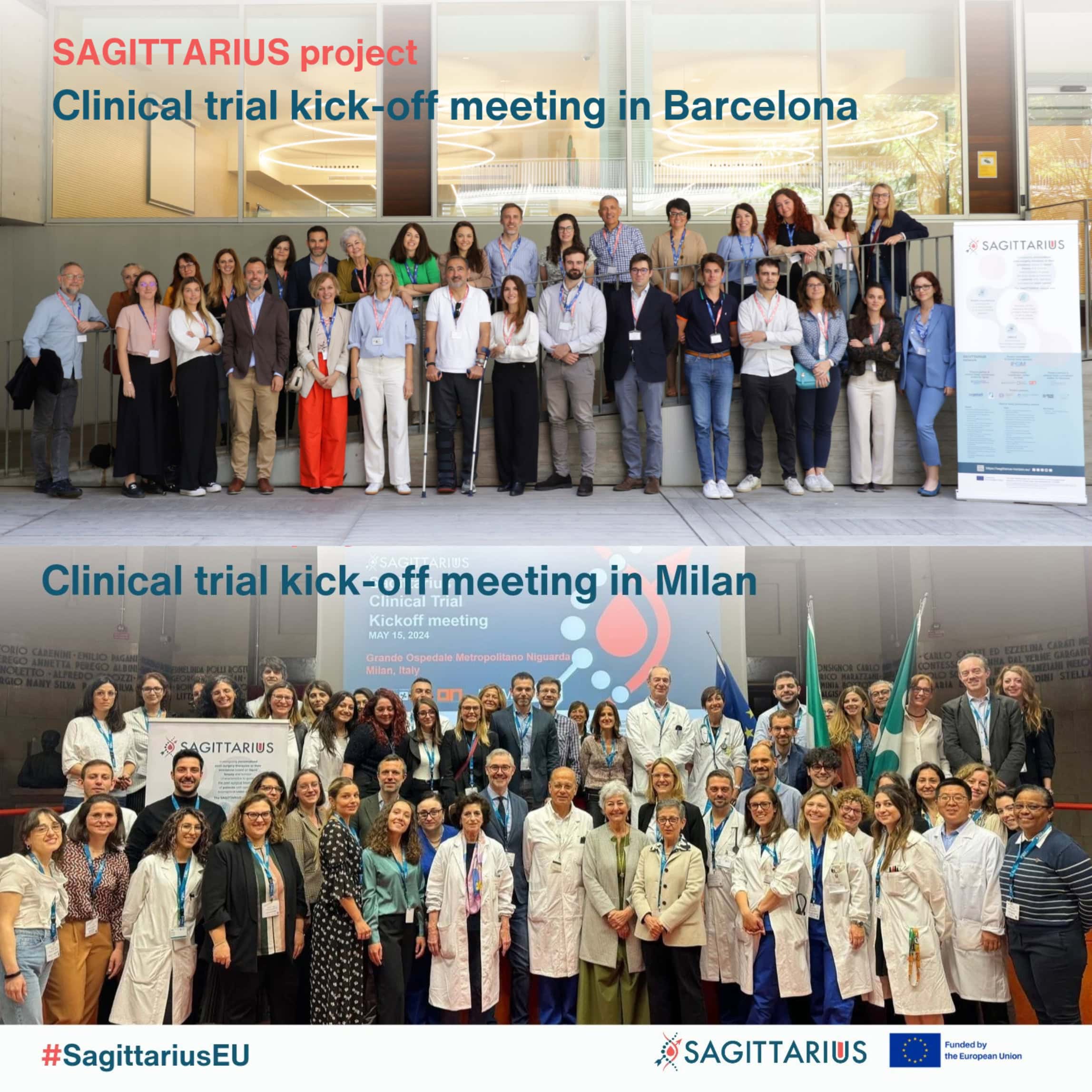13th May 2024 – Hospital del Mar Research Institute, Barcelona, Spain
15th May 2024 – Grande Ospedale Metropolitano Niguarda, Milan, Italy
Towards a precision medicine approach for colon cancer care
Physicians, scientists, health economics researchers, data and communication experts from the Horizon Europe project SAGITTARIUS joined oncology specialists and members of an EU-wide community of cancer centres in Barcelona and Milan to present the SAGITTARIUS clinical study, a new EU-funded clinical trial leveraging the power of tumor genomics and liquid biopsy to guide the post-surgical care of patients with locoregional colon cancer.
Hosted by Niguarda Cancer Center and Fondazione Oncologia Niguarda in Milan and by Hospital del Mar Research Institute in Barcelona, the Spanish-Italian twin events discussed the clinical scenario in which the SAGITTARIUS study will take place, its design and more in-depth technical aspects of this innovative trial.
SAGITTARIUS is the first phase-III randomised clinical study in Europe testing an individualized, tumor-informed liquid biopsy approach to optimize treatment in locoregional colon cancer. The SAGITTARIUS trial involves a network of 26 EU clinical centres and plan to recruit around 700-900 patients in Spain, Germany, and Italy, under the expert guide of Clara Montagut, from the Hospital del Mar Research Institute (HMRIB), as a study chair. Elena Élez from Vall d’Hebron Institute of Oncology (VHIO), Sebastian Stintzing from Charité - Universitätsmedizin Berlin, and Andrea Sartore-Bianchi from Grande Ospedale Metropolitano Niguarda will be the study co-chairs, respectively for Spain, Germany and Italy, along with Salvatore Siena (Niguarda Cancer Center and University of Milan) as principal investigator of the coordinating centre in Italy.
The SAGITTARIUS project
Currently, people with locoregional stage II and operable stage III colon cancer are recommended to have both surgery, to remove the tumor, and post-surgery chemotherapy (called adjuvant chemotherapy), to eliminate any residual cancer cell. Approximately one-third of patients with loco-regional colon cancer, in fact, are at risk of recurrence after surgery due to the presence of a residual microscopic disease which is currently undetectable by the available radiological techniques. Liquid biopsy is a new innovative assay for detecting circulating tumor DNA (ctDNA) in the blood. This minimally invasive analysis has been recently shown to identify cases with micrometastatic molecular disease not yet diagnosable by imaging techniques.
“SAGITTARIUS will capture the individual tumor genetic characteristics to generate a personalized liquid biopsy test for detecting ctDNA in patients’ blood, identifying who has micrometastases and suggesting the most appropriate treatment, tailored on the specific molecular features of a patient’s tumor. With liquid biopsy we will also follow therapy response in order to dynamically personalize the treatment, with the aim to improve both the clinical outcome and the quality of life of each patient” explained Silvia Marsoni from IFOM, SAGITTARIUS project coordinator and clinical study sponsor.
The SAGITTARIUS clinical trial is the centerpiece of the newly started, homonymous project funded by the European Union under the Horizon Europe program, which will measure the potential of the SAGITTARIUS clinical approach considering multiple aspects, which include also the cost-effectiveness of this personalised protocol and its impact on the patient’s quality of life, health and sense of wellbeing.
For more information
In the resources section, you can download the press kit.
Key news will also be shared on SAGITTARIUS site, newsletter and social media profiles: LinkedIn, Facebook, X, Instagram, YouTube.
To set up interviews with SAGITTARIUS leaders, please contact SAGITTARIUS Communication and Media Relations Managers at info@sagittarius-horizon.eu.

